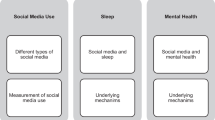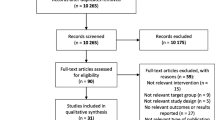Abstract
Little is known about perceptions surrounding self-management for attention deficit hyperactivity disorder (ADHD), although such interventions appear commonly used and are considered essential components of the chronic care model. Our research is part of a mixed methods study that followed students at high and low risk for ADHD over 11 years. During the final study years, area-representative samples of 148 adolescents (54.8 % participation; 97 ADHD high-risk group; 51 low-risk peers) and 161 parents (59.4 % participation; 108 parents of high-risk adolescent; 53 parents of low-risk peer) completed a cross-sectional survey on community-identified self-management interventions for ADHD (activity outlets, sleep regulation, dietary restriction, homework help, family rules, and prayer). Respondents also answered open-ended questions addressing undesirable self-management effects, which were analyzed using grounded theory methods. High-risk adolescents expressed significantly lower willingness towards all self-management interventions than did adult respondents, except for increased activity outlets. They also reported lower receptivity towards sleep regulation and dietary restriction than did their low-risk peer group. No gender or race differences in self-management willingness were found, except for higher receptivity to prayer in African American respondents. Cost, perceived ineffectiveness, disruptions to routines, causation of interpersonal conflicts, and reduced future self-reliance were seen as potential undesirable effects. Findings suggest that activity-based ADHD interventions appear particularly acceptable across all demographic and risk groups, unlike sleep regulation and dietary approaches. Further research on self-care effectiveness is needed to incorporate adolescents’ viewpoints about ADHD self-management, as interventions may be acceptable to adults, but resisted by adolescents.



Similar content being viewed by others
References
Baverstock, A., & Finlay, F. (2012). Faith healing in paediatrics: What do we know about its relevance to clinical practice? Child: Care, Health and Development, 38(3), 316–320. doi:10.1111/j.1365-2214.2011.01284.x.
Berwid, O. G., & Halperin, J. M. (2012). Emerging support for a role of exercise in attention-deficit/hyperactivity disorder intervention planning. Current Psychiatry Reports, 14(5), 543–551. doi:10.1007/s11920-012-0297-4.
Bodenheimer, T., Wagner, E. H., & Grumbach, K. (2002a). Improving primary care for patients with chronic illness. JAMA, 288(14), 1775–1779.
Bodenheimer, T., Wagner, E. H., & Grumbach, K. (2002b). Improving primary care for patients with chronic illness: the chronic care model, Part 2. JAMA, 288(15), 1909–1914.
Brown, R. T., Amler, R. W., Freeman, W. S., Perrin, J. M., Stein, M. T., Feldman, H. M., & Wolraich, M. L. (2005). Treatment of attention-deficit/hyperactivity disorder: overview of the evidence. Pediatrics, 115(6), e749–e757. doi:10.1542/peds.2004-2560.
Bussing, R., Koro-Ljungberg, M. E., Williamson, P., Gary, F. A., & Wilson Garvan, C. (2006). What “Dr Mom” ordered: a community-based exploratory study of parental self-care responses to children’s ADHD symptoms. Social Science and Medicine, 63(4), 871–882. doi:10.1016/j.socscimed.2006.03.014.
Bussing, R., Mason, D. M., Bell, L., Porter, P., & Garvan, C. (2010). Adolescent outcomes of childhood attention-deficit/hyperactivity disorder in a diverse community sample. Journal of the American Academy of Child and Adolescent Psychiatry, 49(6), 595–605. doi:10.1016/j.jaac.2010.03.006.
Bussing, R., Zima, B. T., Mason, D. M., Porter, P. C., & Garvan, C. W. (2011). Receiving treatment for attention-deficit hyperactivity disorder: do the perspectives of adolescents matter? The Journal of Adolescent Health, 49(1), 7–14. doi:10.1016/j.jadohealth.2010.08.014.
Bussing, R., Koro-Ljungberg, M., Noguchi, K., Mason, D., Mayerson, G., & Garvan, C. W. (2012a). Willingness to use ADHD treatments: A mixed methods study of perceptions by adolescents, parents, health professionals and teachers. Social Science and Medicine, 74(1), 92–100. doi:10.1016/j.socscimed.2011.10.009.
Bussing, R., Zima, B. T., Mason, D. M., Meyer, J. M., White, K., & Garvan, C. W. (2012b). ADHD knowledge, perceptions, and information sources: perspectives from a community sample of adolescents and their parents. The Journal of Adolescent Health, 51(6), 593–600. doi:10.1016/j.jadohealth.2012.03.004.
Bussing, R., Koro-Ljungberg, M., Gagnon, J. C., Mason, D. M., Ellison, A., Noguchi, K., & Albarracin, D. (2014). Feasibility of school-based ADHD interventions: A mixed-methods study of perceptions of adolescents and adults. Journal of Attention Disorders,. doi:10.1177/1087054713515747.
Chan, E. (2002). The role of complementary and alternative medicine in attention-deficit hyperactivity disorder. Journal of Developmental and Behavioral Pediatrics: JDBP, 23(1 Suppl), S37–S45.
Charach, A., & Fernandez, R. (2013). Enhancing ADHD medication adherence: challenges and opportunities. Current Psychiatry Reports, 15(7), 371. doi:10.1007/s11920-013-0371-6.
Charmaz, K. (2006). Constructing grounded theory: A practical guide through qualitative analysis. Thousand Oaks, CA: Pine Forge Press.
Crotty, M. (1998). The foundations of social research. London: Sage.
DuPaul, G. J. (2007). School-based interventions for students with attention deficit hyperactivity disorder: Current status and future directions. School Psychology Review, 36(2), 183–194.
Evans, S. W., Owens, J. S., & Bunford, N. (2014). Evidence-based psychosocial treatments for children and adolescents with attention-deficit/hyperactivity disorder. Journal of Clinical Child and Adolescent Psychology, 43(4), 527–551. doi:10.1080/15374416.2013.850700.
Fosnot, C. (Ed.). (2005). Constructivism: Theory, perspectives, and practice (2nd ed.). New York: Teachers College Press.
Funnell, M. M., Brown, T. L., Childs, B. P., Haas, L. B., Hosey, G. M., Jensen, B., et al. (2010). National standards for diabetes self-management education. Diabetes Care, 33(Suppl 1), S89–S96. doi:10.2337/dc10-S089.
Glaser, B. G. (1978). Advances in methodology of grounded theory. Mill Valley, CA: Sociological Press.
Guba, E. (Ed.). (1990). The paradigm dialog. Newbury Park, CA: Sage.
Gureasko-Moore, S., Dupaul, G. J., & White, G. P. (2006). The effects of self-management in general education classrooms on the organizational skills of adolescents with ADHD. Behavior Modification, 30(2), 159–183. doi:10.1177/0145445503259387.
Hamm, M. P., Shulhan, J., Williams, G., Milne, A., Scott, S. D., & Hartling, L. (2014). A systematic review of the use and effectiveness of social media in child health. BMC Pediatrics, 14, 138. doi:10.1186/1471-2431-14-138.
Hollingshead, A. B. (1975). Four Factor Index of social class. New Haven, CT: Yale University.
Holton, J. A. (2007). The coding process and its challenges. In K. Charmaz & A. Bryant (Eds.), The Sage handbook of grounded theory (pp. 265–289). London: Sage Publications.
Konofal, E., Lecendreux, M., & Cortese, S. (2010). Sleep and ADHD. Sleep Medicine, 11(7), 652–658. doi:10.1016/j.sleep.2010.02.012.
Lara, C., Fayyad, J., de Graaf, R., Kessler, R. C., Aguilar-Gaxiola, S., Angermeyer, M., & Sampson, N. (2009). Childhood predictors of adult attention-deficit/hyperactivity disorder: results from the World Health Organization World Mental Health Survey Initiative. Biological Psychiatry, 65(1), 46–54. doi:10.1016/j.biopsych.2008.10.005.
Leggett, C., & Hotham, E. (2011). Treatment experiences of children and adolescents with attention-deficit/hyperactivity disorder. Journal of Paediatrics and Child Health, 47(8), 512–517. doi:10.1111/j.1440-1754.2011.02013.x.
Lucock, M., Gillard, S., Adams, K., Simons, L., White, R., & Edwards, C. (2011). Self-care in mental health services: A narrative review. Health and Social Care in the Community, 19(6), 602–616. doi:10.1111/j.1365-2524.2011.01014.x.
Millichap, J. G., & Yee, M. M. (2012). The diet factor in attention-deficit/hyperactivity disorder. Pediatrics, 129(2), 330–337. doi:10.1542/peds.2011-2199.
Nigg, J. T., Lewis, K., Edinger, T., & Falk, M. (2012). Meta-analysis of attention-deficit/hyperactivity disorder or attention-deficit/hyperactivity disorder symptoms, restriction diet, and synthetic food color additives. Journal of the American Academy of Child and Adolescent Psychiatry, 51(1), 86–97. doi:10.1016/j.jaac.2011.10.015. (e88).
Owens, J. A. (2008). Sleep disorders and attention-deficit/hyperactivity disorder. Current Psychiatry Reports, 10(5), 439–444.
Parker, D. R., Hoffman, S. F., Sawilowsky, S., & Rolands, L. (2013). Self-control in postsecondary settings: Students’ perceptions of ADHD college coaching. Journal of Attention Disorders, 17(3), 215–232. doi:10.1177/1087054711427561.
Pliszka, S. (2007). Practice parameter for the assessment and treatment of children and adolescents with attention-deficit/hyperactivity disorder. Journal of the American Academy of Child and Adolescent Psychiatry, 46(7), 894–921. doi:10.1097/chi.0b013e318054e724.
Rommel, A. S., Halperin, J. M., Mill, J., Asherson, P., & Kuntsi, J. (2013). Protection from genetic diathesis in attention-deficit/hyperactivity disorder: Possible complementary roles of exercise. Journal of the American Academy of Child and Adolescent Psychiatry, 52(9), 900–910. doi:10.1016/j.jaac.2013.05.018.
Sawyer, M. G., Rey, J. M., Arney, F. M., Whitham, J. N., Clark, J. J., & Baghurst, P. A. (2004). Use of health and school-based services in Australia by young people with attention-deficit/hyperactivity disorder. Journal of the American Academy of Child and Adolescent Psychiatry, 43(11), 1355–1363. doi:10.1097/01.chi.0000138354.90981.5b.
Sciberras, E., Fulton, M., Efron, D., Oberklaid, F., & Hiscock, H. (2011). Managing sleep problems in school aged children with ADHD: A pilot randomised controlled trial. Sleep Medicine, 12(9), 932–935. doi:10.1016/j.sleep.2011.02.006.
Sinha, D., & Efron, D. (2005). Complementary and alternative medicine use in children with attention deficit hyperactivity disorder. Journal of Paediatrics and Child Health, 41(1–2), 23–26. doi:10.1111/j.1440-1754.2005.00530.x.
Van Cleave, J., & Leslie, L. K. (2008). Approaching ADHD as a chronic condition: Implications for long-term adherence. Pediatric Annals, 37(1), 19–26.
Weiss, M. D., Wasdell, M. B., Bomben, M. M., Rea, K. J., & Freeman, R. D. (2006). Sleep hygiene and melatonin treatment for children and adolescents with ADHD and initial insomnia. Journal of the American Academy of Child and Adolescent Psychiatry, 45(5), 512–519. doi:10.1097/01chi.0000205706.78818.ef.
WHO. (1984). Health education in self-care: Possibilities and limitations. Geneva: The World Health Organization.
Wolraich, M., Brown, L., Brown, R. T., DuPaul, G., Earls, M., Feldman, H. M., & Visser, S. (2011). ADHD: clinical practice guideline for the diagnosis, evaluation, and treatment of attention-deficit/hyperactivity disorder in children and adolescents. Pediatrics, 128(5), 1007–1022. doi:10.1542/peds.2011-2654.
Yeh, M., Hough, R. L., McCabe, K., Lau, A., & Garland, A. (2004). Parental beliefs about the causes of child problems: exploring racial/ethnic patterns. Journal of the American Academy of Child and Adolescent Psychiatry, 43(5), 605–612. doi:10.1097/00004583-200405000-00014.
Acknowledgments
The authors thank the parents, adolescents, teachers and health professionals whose participation made the study possible. This study was supported by Grant RO1MH57399 from the National Institute of Mental Health.
Author information
Authors and Affiliations
Corresponding author
Rights and permissions
About this article
Cite this article
Bussing, R., Koro-Ljungberg, M., Gurnani, T. et al. Willingness to Use ADHD Self-Management: Mixed Methods Study of Perceptions by Adolescents and Parents. J Child Fam Stud 25, 562–573 (2016). https://doi.org/10.1007/s10826-015-0241-4
Published:
Issue Date:
DOI: https://doi.org/10.1007/s10826-015-0241-4




